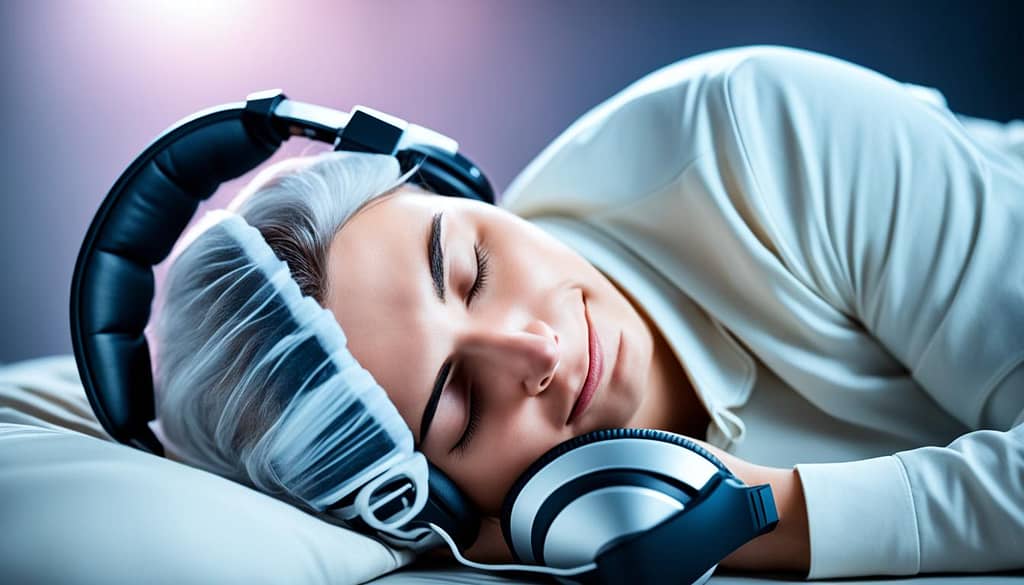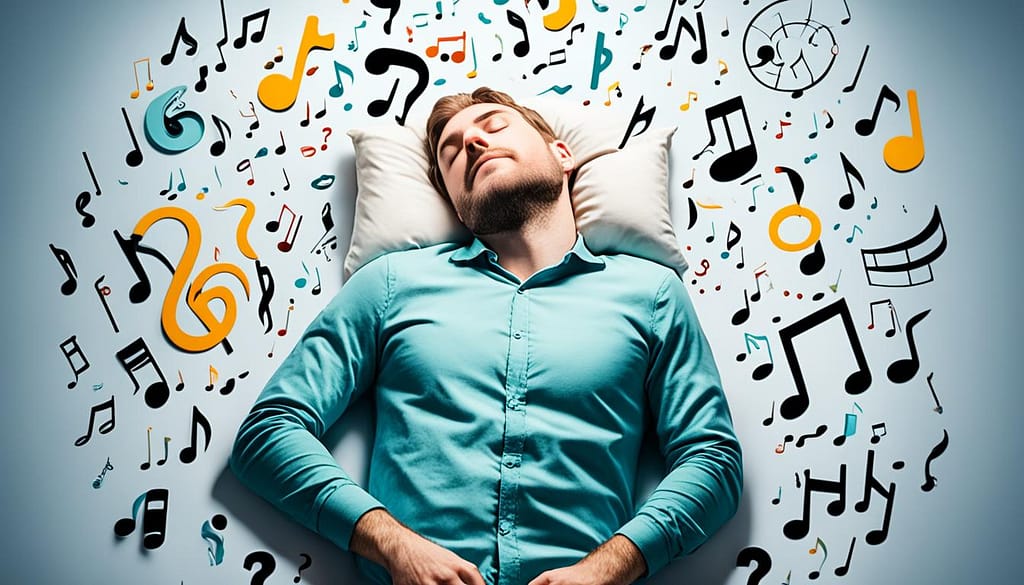Imagine you’ve had a long day and just want to sleep. You grab your phone, open a music app, and play some calming tunes. The music makes you feel sleepy, but you wonder: “Is it okay to sleep with music on?”
Music and sleep have a complex relationship. Music can relax you, but it also has effects on your sleep quality. This article will look into how music affects sleep, clear up myths, and give you facts to help you sleep better.
Key Takeaways
- Music can make you fall asleep faster and improve your sleep quality.
- But, using music for sleep needs careful thought. Volume, music type, and what you like matter.
- Using earbuds or headphones all night can be uncomfortable or even harm your hearing. So, find a good balance.
- Adding music to your sleep routine can help, but try different things to see what works for you.
- Talking to a doctor can give you advice on using music for sleep, especially if you have sleep issues or health problems.
Music and Sleep: A Bedtime Companion
Many studies show that music can greatly improve sleep quality. The link between music and sleep is interesting and has caught the eye of sleep experts. Understanding this link can help make your sleep better.
Exploring the Interplay Between Music and Sleep Quality
Our brains react to music on a deep level. Listening to calming music can make you relax and distract you from stressful thoughts. It can also block out noise, making it easier to fall asleep with music.
Research says adding music to your bedtime routine can make you fall asleep faster and sleep better. Music’s rhythms and tunes can set a sleep pattern. Playing the same song every night tells your body it’s time to sleep.
“Music has the power to soothe the mind, relax the body, and create the perfect environment for a restful night’s sleep.”
Choosing the right music, like classical, ambient, or nature sounds, can greatly help you fall asleep with music. Exploring how music affects sleep can lead to better sleep and feeling refreshed.
The Science Behind Music’s Sleep-Inducing Effects
Music’s effect on sleep is more than just stories. Many studies show how music changes the human mind and body. This knowledge helps us use music to get better sleep.
Calming the Mind and Body
Music can change our body’s automatic functions. Soothing music can make us relax and sleep better. It lowers blood pressure, heart rate, and stress hormones.
This is great for people who can’t sleep well. Music helps calm the mind and body. It makes falling asleep and staying asleep easier.
Regulating Brainwave Activity
Music also changes how our brain waves work. Slow, repetitive music can make our brain waves match the sleep state. This helps us enter deep, restful sleep.
Knowing how music affects us lets us make better sleep plans. We can choose music that fits our needs and helps us sleep better.
“Music is a moral law. It sets the soul in motion and brings the mind into accord with the body.” – Plato
The Mood-Altering Power of Music
Music greatly affects our feelings and mood. Studies show how music changes the human body’s chemistry. It can quickly make you feel better and reduce stress by changing your hormones.
Happy music makes serotonin levels go up. This is the chemical that makes us feel good and content. This can make you feel less stressed and more positive.
What music makes you feel good is personal. It’s important to choose music that you like and that fits your feelings.
“Music has the power to instantly lift your spirits and transform your emotional state. By tapping into the biological mechanisms that govern our feelings, it can be a powerful tool for managing stress and cultivating a more positive outlook on life.”
If you’re feeling down or just need to relax, the right music can help. Using music to change your mood can improve your emotional health. It can make you feel more positive and balanced.
Find music that really speaks to you to get the most out of its mood-boosting effects. Try different types of music until you find what lifts your spirits and reduces stress best.
is it bad to fall asleep with music
Examining the Potential Risks and Benefits
Falling asleep with music can be good and bad. Experts say music can help you sleep better. But, there are risks to consider before adding music to your bedtime routine.
One big worry is your hearing health. Using in-ear headphones or earbuds at night can cause earwax buildup. This might lead to infections, pain, and hearing loss over time. On-ear headphones can also cut off blood flow, causing tissue damage.
Another concern is the music’s volume. If it’s too loud, it can hurt your hearing and keep you awake. Your phone or music player can also affect your body temperature and health.
To avoid these problems, try using a wireless speaker instead. This way, you can enjoy music’s calming effects without harming your ears.
| Potential Risks of Sleeping with Music | Potential Benefits of Sleeping with Music |
|---|---|
|
|
The risks of sleeping with music are real, but so are the benefits. If you use music wisely, it can greatly improve your sleep. Knowing the pros and cons helps you make a choice that’s best for your health.

Choosing the Right Music for Better Sleep
Choosing the right music can greatly improve your sleep. Experts suggest certain types of music to help you sleep better. They recommend creating a playlist for sleep.
Start with relaxing sleep music that has slow, steady notes. This kind of music calms your mind and body, making it easier to fall asleep.
Also, focus on lower frequencies around 500 Hz and below. These sounds are soothing and help you relax, leading to better sleep.
- Prefer music with stronger bass and moody, non-danceable rhythms.
- Keep the volume under 40 decibels, as louder music can actually disrupt sleep.
There are many ready-made sleep meditation music playlists available, free and paid. You can find music that suits your taste, like nature sounds, instrumentals, or soft vocals. Each genre has its own way to help you sleep.
| Recommended Sleep Music Characteristics | Explanation |
|---|---|
| Slow, sustained musical notes | This type of music has a calming effect, helping the mind and body transition into a restful state. |
| Lower frequencies (around 500 Hz and below) | Lower frequencies have been shown to have a soothing effect, promoting relaxation and better sleep quality. |
| Stronger bass and moody, non-danceable rhythms | These musical elements can contribute to a more relaxing and sleep-inducing listening experience. |
| Volume under 40 decibels | Louder music can disrupt sleep, so keeping the volume low is important for optimal sleep quality. |
By picking the best music for sleep, you can make a sleep routine that works for you. Try out different music genres for sleep to see what helps you sleep best.
Avoiding the Earworm Effect
If you often get “earworms” – catchy tunes stuck in your head – they might mess with your sleep. Research shows earworms can even sneak into your dreams. This makes it tough to fall asleep and stay asleep.
People who listen to a lot of music are more likely to get earworms. These tunes can keep you awake at night. So, the more music you listen to, the more you might experience these annoying earworms.
Strategies to Prevent Earworms from Disrupting Sleep
To stop earworms from ruining your sleep, try these tips:
- Listen to music less before bed. Avoid catchy tunes that might stick in your head.
- Take breaks from music if earworms bother you a lot. A break can help stop the cycle.
- Don’t listen to music right before bed. It can keep you awake.
- Do something that distracts your brain from the earworm. Writing a list or solving a puzzle can help.
Using these tips can help keep earworms from ruining your sleep. This way, you can get a good night’s rest.
Managing earworms and sleeping well is all about balance. Make sure to follow healthy sleep habits every day.
Incorporating Music into Your Sleep Routine
Creating a regular sleep routine is key to getting good sleep. Adding music to your bedtime can help make it better. Music can calm your body and mind, making it easier to fall asleep.
Choose music that makes you feel calm and relaxed. Stay away from songs that make you feel emotional or keep you awake. Go for instrumental tunes, nature sounds, or soft singing that helps you relax.
Here are some tips to add music to your sleep routine:
- Place a small speaker or stereo near your bed, keeping the volume low.
- Don’t use headphones or earbuds to avoid discomfort and ear issues.
- Make a bedtime playlist that you can count on every night.
- Combine your music with relaxing activities like stretching, reading, or meditation.
It’s important to pick music that you find calming and fun. By adding music to your sleep routine and creating a sleep-promoting music routine, you can improve your sleep quality. Sound can be a powerful ally for better sleep.
“Music has a profound effect on our bodies and minds, and it can be a powerful tool in promoting better sleep. The right music can help us relax, reduce stress, and transition into a more restful state.”
| Music Genre | Impact on Sleep |
|---|---|
| Instrumental Music | Helps reduce brain activity and promotes relaxation. |
| Nature Sounds | Can have a calming and soothing effect, masking disruptive environmental noises. |
| Soft, Slow-Paced Vocals | May help lower heart rate and blood pressure, aiding in the transition to sleep. |
The Role of Music Therapy in Sleep Enhancement
If you’re having trouble sleeping, music therapy might be the answer. Certified music therapists use music to help improve your mental and physical health. This includes making your sleep better.
They don’t just play any music. They create a plan just for you. They consider what you like, your sleep habits, and any health issues that affect your sleep.
Exploring the Potential of Personalized Music Interventions
The National Institutes of Health and the John F. Kennedy Center for the Performing Arts have teamed up. They’re studying how music therapy for sleep can help with health. Early studies show that personalized music interventions can really help you sleep better.
With a certified music therapist, you can learn about the benefits of music therapy for sleep. You’ll see how it can fit into your sleep routine. The right music can make falling asleep easier and make your sleep more refreshing.
“Music has a unique ability to engage the mind, body, and emotions, making it a powerful tool for promoting better sleep and overall health.”
Tips for Maximizing the Sleep Benefits of Music
Using music to improve your sleep is all about being consistent. Make music a part of your bedtime routine. This helps your body and mind link those tunes with relaxation and sleep. Try out different songs and playlists to find the best one for you.
Stay away from songs that make you feel strong emotions. These can keep you awake. Choose calming music that makes you feel peaceful. Also, pay attention to how loud the music is and what kind of headphones you use. Too much noise or bad lighting can ruin the sleep benefits of music.
- Establish a consistent bedtime routine that includes music.
- Experiment with different genres and playlists to find your optimal sleep music.
- Avoid songs that trigger emotional reactions, as they may disrupt relaxation.
- Monitor the volume and type of headphones or speakers to ensure optimal sleep conditions.
- Engage in relaxing mental activities, like writing a to-do list, to help distract your brain from any potential earworms.
Follow these tips to make the most of your sleep music. By using music wisely, you can greatly improve your sleep. Sweet dreams!
“Music has a powerful effect on our minds and bodies, and when used strategically, it can be a valuable tool for improving sleep quality.”
The Impact of Noise on Sleep Quality
At night, noises from busy roads, airplanes, or loud neighbors can ruin your sleep. Studies show that these sounds can lead to health problems, like heart disease.
But, music can help. Listening to calming tunes can make your bedroom quieter and help you sleep better. This means you might sleep longer and more soundly.
Using Music to Mask Environmental Sounds
Choosing the right music is key. Pick songs that cover up disturbing sounds and calm your mind. Research says music like nature sounds or classical music works well to block out noise and relax you.
Adding music to your bedtime routine makes your sleep space calmer. This is great for city dwellers or those near constant noise. It helps you sleep better.
| Type of Noise | Impact on Sleep Quality | Music Masking Effectiveness |
|---|---|---|
| Traffic Noise | Reduced sleep efficiency, increased risk of cardiovascular disease | Highly effective in masking low-frequency traffic sounds |
| Airplane Noise | Disrupted sleep patterns, increased wakeups, and reduced sleep duration | Moderately effective in masking intermittent, high-frequency aircraft noises |
| Neighbors’ Noise | Increased stress and anxiety, reduced sleep quality | Highly effective in masking intermittent, unpredictable human-generated sounds |
Knowing how noise affects sleep and using music to block out sounds can improve your sleep. This is a big step towards sleeping better and feeling rested.
Conclusion
Adding music to your sleep routine can greatly improve your rest. But, it’s important to do it thoughtfully. Music can calm you down and help you sleep better. Yet, wearing headphones or earbuds can cause physical problems, and some music might keep you awake because of the earworm effect.
Choosing the right music and sticking to a bedtime routine can help. Also, being careful with the volume and how you use your devices is key. Personalized music therapy might be even more helpful for those who have trouble sleeping often.
The main points are to pick your music carefully, add it to your bedtime routine, and watch out for risks. With the right steps, music can be a simple yet strong way to get the sleep your body and mind need.
FAQ
Is it bad to fall asleep with music?
Music can make sleep better, but it has risks too. These include earwax buildup, infections, ear pain, and hearing loss from headphones or earbuds all night. It’s better to use a wireless speaker to keep your ears safe.
How does music affect sleep quality?
Studies show calming music helps you fall asleep faster and sleep better. It relaxes you, distracts from stress, and covers up noise.
What types of music are best for sleep?
Experts suggest relaxing music with slow beats, low frequencies, strong bass, and non-danceable rhythms. Keep the volume soft, under 40 decibels.
Can music cause “earworms” that disrupt sleep?
Yes, catchy songs can get stuck in your head and ruin sleep. To avoid this, limit music before bed and do something else to keep your mind busy.
How can I incorporate music into my sleep routine?
A bedtime routine with calming music helps sleep. Pick songs that don’t make you feel too emotional. Also, be careful with the volume and type of headphones or speakers used.
What are the benefits of using music therapy for sleep?
Music therapists create music just for you, based on your sleep needs and health. This can work better than general playlists or picking your own music.
How can music help mask disruptive environmental noises?
Soothing music can block out noises from roads, planes, or neighbors. This makes it easier to sleep and might make you sleep better and longer.
Source Links
- Is It Bad to Listen to Music While Sleeping? – RelaxifyApp – https://relaxifyapp.com/is-it-bad-to-listen-to-music-while-sleeping/
- Music and Sleep – https://www.sleepfoundation.org/noise-and-sleep/music
- Why Music at Bedtime Might Not Be a Great Idea – https://www.healthday.com/health-news/mental-health/b-6-14-why-music-at-bedtime-might-not-be-a-great-idea-2653302819.html

